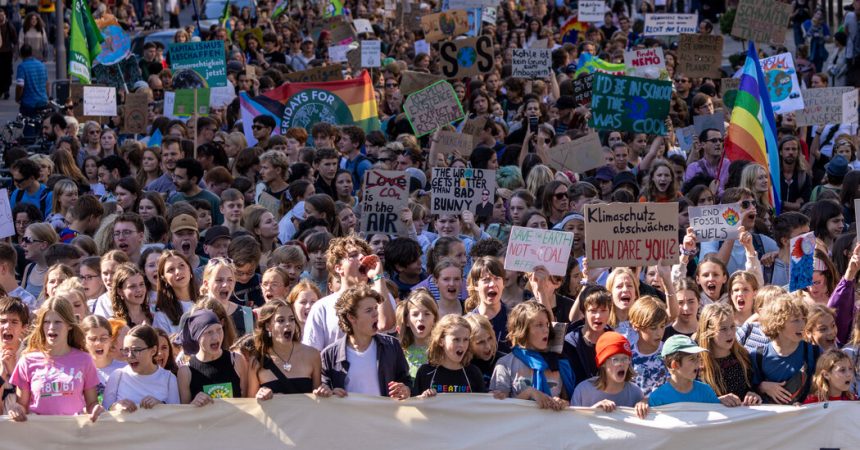Tens of thousands of people, including students, retirees, scientists, politicians and celebrities, began to fill the streets of Midtown Manhattan on Sunday to demand that world leaders quickly pivot away from the fossil fuels that are dangerously heating up the planet.
Sunday’s demonstrations were part of a weekend of large peaceful protests in Germany, England, Senegal, South Korea, India and elsewhere, mostly led by young people.
“Rather than taking meaningful climate action, the government is supporting the fossil fuel industry to prioritize corporate interests and groups of power,” said Borim Kim, who helped organize the event in Samcheok, South Korea, where protesters marched along a road next to coal trucks and stood in front of the city’s newest coal-fired power plant.
“Let’s end fossil fuels,” they chanted in Korean, according to Ms. Kim. “We can still do it.”
The climate protests, the largest since before the Covid-19 pandemic, come on the heels of the hottest summer on record, exacerbated by planetary warming, and alongside record profits for oil and gas companies.
And they signal the flashpoint looming over the United Nations’ meetings in New York this week and climate talks scheduled for November in the United Arab Emirates. Activists are demanding that coal, oil and gas remain in the ground while industry leaders say they can continue to drill while cleaning up the pollution that fossil fuels produce.
“In order to solve the climate crisis, we have to stop our reliance on fossil fuels,” said Emma Buretta, 17, a New York City high school student and an organizer with the Fridays for Future movement. “A lot of previous climate marches haven’t focused on that.”
The protests indicate a shift in message and tone from climate advocates, who have grown increasingly frustrated at the continued expansion of fossil fuel projects alongside promises by oil and gas companies to use emerging and often costly technologies to capture carbon dioxide from the air and bury it underground.
According to scientific models as well as projections by the International Energy Agency, nations must stop new oil, gas and coal projects if the world is to stay within relatively safe levels of atmospheric warming.
“We know there can be no new drilling if we want a habitable world, yet politicians in these countries are still bowing to the demands of this profiteering industry that will push us past critical climate limits if allowed,” said Lauren MacDonald, a British activist campaigning to stop the approval of a new oil and gas field, called Rosebank, in the North Atlantic.
Activists are especially angry that this year’s U.N. climate negotiations are set to take place in the United Arab Emirates, a leading oil-producing state, and will be overseen by Sultan al-Jaber, head of the Emirati state-owned oil giant, ADNOC.
But he is not the only target of the activists’ ire. They are also keen to send a pointed message to President Biden as he begins his push for re-election: Do more if you want our votes.
The Biden administration has shepherded through the United States’ most ambitious climate law and is working to transition the country to wind, solar and other renewable energies.
But the United States has also continued to approve permits for new oil and gas drilling. That has enraged many of Mr. Biden’s traditional supporters, as well as politicians on the left flank of the Democratic Party, who want him to declare a climate emergency and block any new fossil fuel production. A few lawmakers from the party’s progressive wing are scheduled to speak Sunday afternoon at a rally at the end of the march.
The president “is in a unique position to be a leader to end the fossil fuel movement globally,” said Daphne Frias, 25, a climate activist. “It’s time for the United States but particularly the Global North to really step up and say that we are taking responsibility to the way that we have harmed and polluted.”
At the same time, climate protests are becoming more confrontational, with civil disobedience actions that invite arrest. Activists have thrown pies at glass-covered paintings, disrupted a U.S. Open tennis match and glued themselves to oil company buildings.
Civil disobedience actions are planned for Monday in Lower Manhattan.









